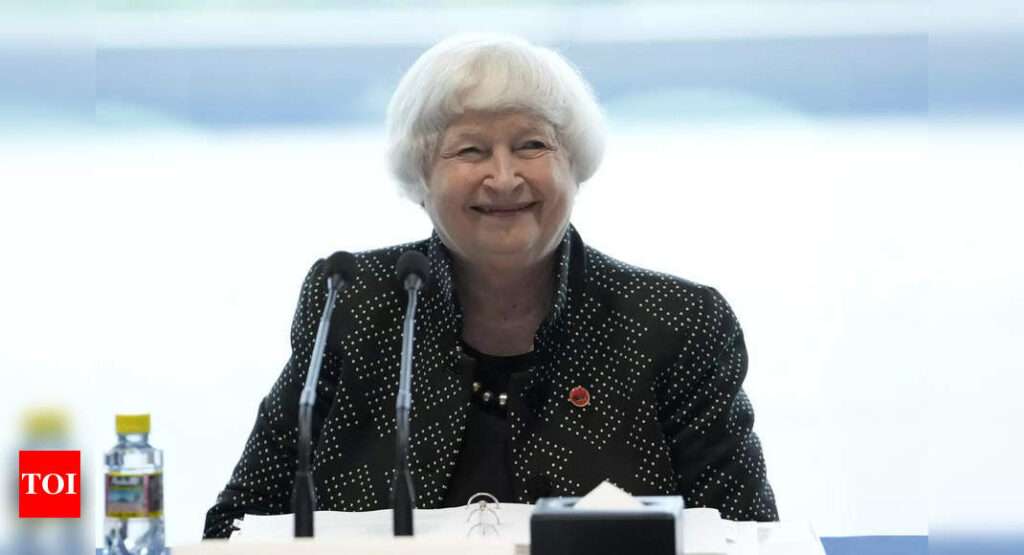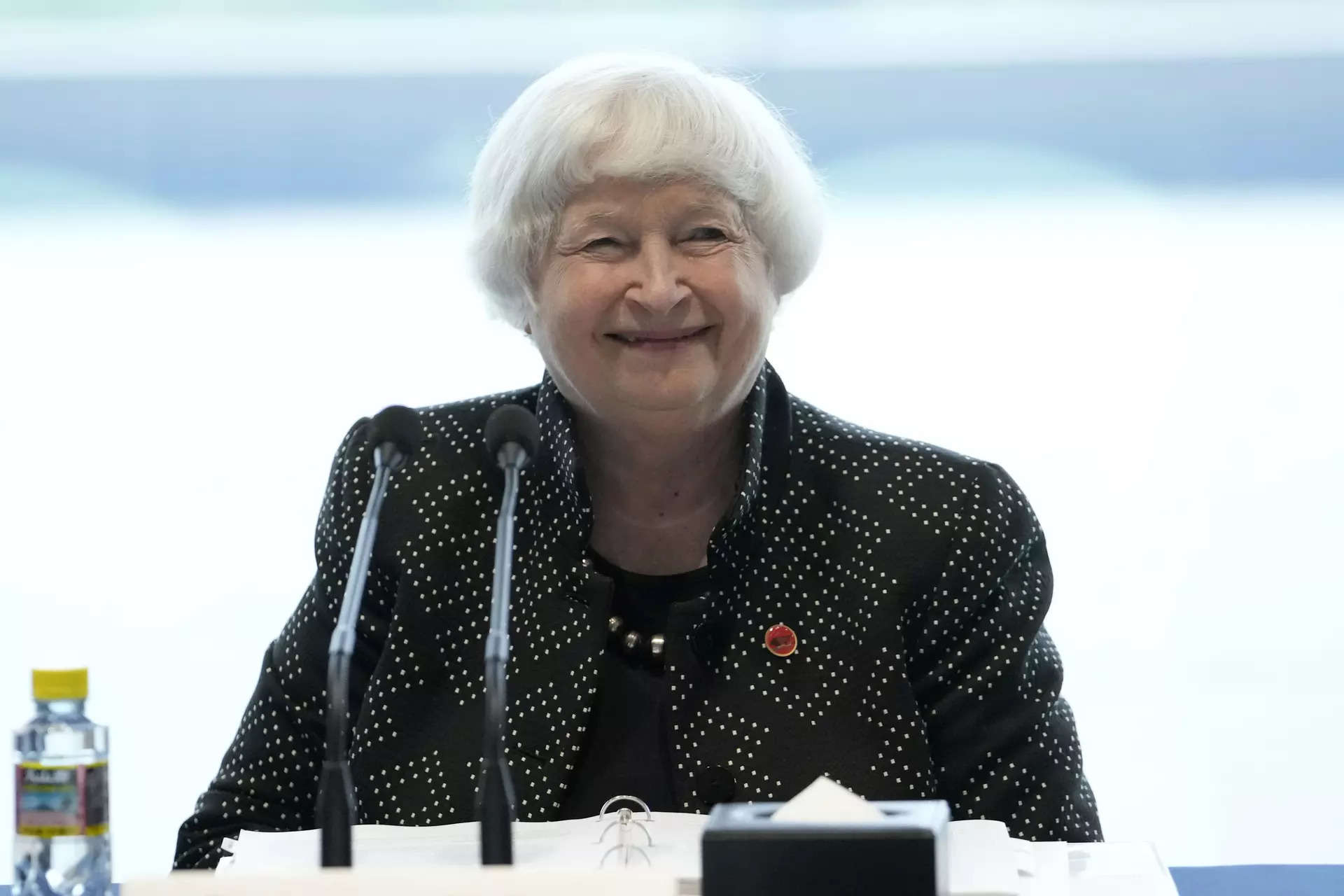US treasury secretary Janet Yellen chided China’s government for “unfair” treatment of American and other foreign companies and called on Beijing to return to the pro-market reforms of the past, at the start of her four-day visit to the country.
China has pursued “unfair economic practices, including imposing barriers to access for foreign firms and taking coercive actions against American companies,” Yellen said in prepared remarks Friday in the southern city of Guangzhou.“I intend to raise these issues in meetings this week.”
Ties between the world’s two biggest economies have shown signs of improving since Presidents Joe Biden and Xi Jinping met in November. But deep differences remain, and they’ve been exacerbated by China’s drive to boost manufacturing investment, an effort to offset the country’s real estate slump. The US and allies have cried foul over unfair competition, while China accuses them of trying to protect their own less-efficient industries.
For Xi’s team, the Yellen visit also marks one of the last chances to shape American policy before November’s US election, in which both candidates are vying to look tough on China. Former President Donald Trump has already threatened a 60% tariff on Chinese goods if elected.
‘Market approach’
Yellen began her trip in Guangzhou, a key trading hub in the southern province of Guangdong, a manufacturing and export powerhouse. She highlighted former leader Deng Xiaoping’s 1992 visit to the city as an important milestone in China’s transformation toward a market economy — and urged a renewed focus on reforms from China’s current leadership.
In remarks at an event hosted by the American Chamber of Commerce in China, Yellen cited a recent survey by the organization that found one third of American firms in China report unfair treatment compared to local competitors.
“I strongly believe that this doesn’t only hurt these American firms: ending these unfair practices would benefit China by improving the business climate here,” Yellen said. She added that many US businesses are concerned about “the impacts of China’s shift away from a market approach.”
President Xi Jinping in recent years has overseen a strengthening of the role of the Communist Party in China’s economy, and championed state-led efforts to strengthen new industries like electric vehicles and solar technology.
Yellen repeatedly flagged her concerns about industrial overcapacity in China fueled by government subsidies. The US has been keen to frame that as a concern for other countries too. When the Treasury chief met with foreign business leaders earlier on Friday to hear their take, executives from Europe and Japan were among those invited.
“Direct and indirect government support is currently leading to production capacity that significantly exceeds China’s domestic demand, as well as what the global market can bear,” Yellen said at the chamber’s event. “If policies are oriented only at generating supply and not also at generating demand, global spillovers will result.”
‘Classic protectionism’
The topic has emerged as Yellen’s No. 1 message for her swing through the country, which will also see her travel to the capital of Beijing. She raised the issue earlier Friday at her first event in China, a meeting with Guangdong Governor Wang Weizhong.
She’ll likely encounter plenty of pushback during the visit, her second in nine months. China argues that its companies are being unfairly excluded by developed nations that can’t compete on price.
Last month Beijing accused the US of engaging in “classic protectionism” by seeking to erect barriers to Chinese EVs, and filed a case with the World Trade Organization over American subsidies for the industry.
Later on Friday, Yellen is scheduled to begin a series of meetings with Vice Premier He Lifeng, China’s economic policy czar. The pair will convene a bilateral meeting with staff, followed by a dinner and an evening boat excursion on the Pearl River.
The two will hold another meeting and a working lunch Saturday before Yellen travels on to Beijing.
China has pursued “unfair economic practices, including imposing barriers to access for foreign firms and taking coercive actions against American companies,” Yellen said in prepared remarks Friday in the southern city of Guangzhou.“I intend to raise these issues in meetings this week.”
Ties between the world’s two biggest economies have shown signs of improving since Presidents Joe Biden and Xi Jinping met in November. But deep differences remain, and they’ve been exacerbated by China’s drive to boost manufacturing investment, an effort to offset the country’s real estate slump. The US and allies have cried foul over unfair competition, while China accuses them of trying to protect their own less-efficient industries.
For Xi’s team, the Yellen visit also marks one of the last chances to shape American policy before November’s US election, in which both candidates are vying to look tough on China. Former President Donald Trump has already threatened a 60% tariff on Chinese goods if elected.
‘Market approach’
Yellen began her trip in Guangzhou, a key trading hub in the southern province of Guangdong, a manufacturing and export powerhouse. She highlighted former leader Deng Xiaoping’s 1992 visit to the city as an important milestone in China’s transformation toward a market economy — and urged a renewed focus on reforms from China’s current leadership.
In remarks at an event hosted by the American Chamber of Commerce in China, Yellen cited a recent survey by the organization that found one third of American firms in China report unfair treatment compared to local competitors.
“I strongly believe that this doesn’t only hurt these American firms: ending these unfair practices would benefit China by improving the business climate here,” Yellen said. She added that many US businesses are concerned about “the impacts of China’s shift away from a market approach.”
President Xi Jinping in recent years has overseen a strengthening of the role of the Communist Party in China’s economy, and championed state-led efforts to strengthen new industries like electric vehicles and solar technology.
Yellen repeatedly flagged her concerns about industrial overcapacity in China fueled by government subsidies. The US has been keen to frame that as a concern for other countries too. When the Treasury chief met with foreign business leaders earlier on Friday to hear their take, executives from Europe and Japan were among those invited.
“Direct and indirect government support is currently leading to production capacity that significantly exceeds China’s domestic demand, as well as what the global market can bear,” Yellen said at the chamber’s event. “If policies are oriented only at generating supply and not also at generating demand, global spillovers will result.”
‘Classic protectionism’
The topic has emerged as Yellen’s No. 1 message for her swing through the country, which will also see her travel to the capital of Beijing. She raised the issue earlier Friday at her first event in China, a meeting with Guangdong Governor Wang Weizhong.
She’ll likely encounter plenty of pushback during the visit, her second in nine months. China argues that its companies are being unfairly excluded by developed nations that can’t compete on price.
Last month Beijing accused the US of engaging in “classic protectionism” by seeking to erect barriers to Chinese EVs, and filed a case with the World Trade Organization over American subsidies for the industry.
Later on Friday, Yellen is scheduled to begin a series of meetings with Vice Premier He Lifeng, China’s economic policy czar. The pair will convene a bilateral meeting with staff, followed by a dinner and an evening boat excursion on the Pearl River.
The two will hold another meeting and a working lunch Saturday before Yellen travels on to Beijing.


